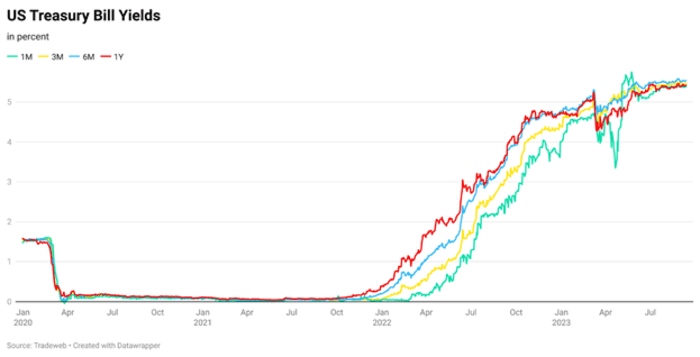[ad_1]
Yields on Treasury bills pushed above 5.4% on Tuesday to top what investors can earn by parking cash at the Federal Reserve’s reverse repo facility, according to Tradeweb data.
This chart shows the sharp increase in one-month
BX:TMUBMUSD01M
to one-year Treasury Treasury yields
BX:TMUBMUSD01Y
since January 2022, in the months before the Fed began to dramatically raise its policy rate to stomp out high inflation.

T-bill yields are staying aloft above 5%.
Tradeweb
T-bills are U.S. government-issued securities that mature in a year or less. The Fed’s policy rate in July was increased to a 5.25% to 5.5% range, the highest in 22 years, helping push bond yields higher.
Of note, bill yields jumped the most on government securities that mature in one month, two months and three months
BX:TMUBMUSD03M
over the past year, up more than 100 basis points, according to Tradeweb.
Yields on the four-month, six-month
BX:TMUBMUSD06M
and one-year bills also gained roughly 69-81 basis points in the same stretch.
An elevated fed policy rate helped lift all six series of Treasury bills above 5.4%, according to Tradeweb data, whereas the Fed’s overnight reverse repo rate has been steady at 5.3% since July 26, when the central bank last hiked rates.
Loftier Treasury yields have enticed money-market funds and other investors into short-term government bills, a place many park cash over the short term to earn a return.
Read: Higher Treasury yields are giving stocks a run for their money
At the same time, overnight demand for the Fed’s reverse repo facility has been dropping, signaling less need for a key cog in the plumbing of financial markets over the past two years.
Demand for the facility peaked at slightly more than $2.5 trillion in December, but had dropped below $1.49 trillion on Tuesday, the lowest level since March 2022, according to New York Fed data.
Also pushing up Treasury-bill yields has been a deluge of new supply to refill coffers run low by the U.S. debt-ceiling fight. In August, the Treasury raised its expected borrowing need to $1 trillion for the third quarter.
Read next: U.S. budget deficit will double this year to $2 trillion, excluding student loans, CBO says
See: Why the deficit is a ‘big time’ worry
Stocks
DJIA
SPX
closed lower on Tuesday, with Apple’s
AAPL,
release of its latest iPhones and other consumer products failing to lift technology stocks. The benchmark 10-year Treasury yield
BX:TMUBMUSD10Y
was near 4.263% Tuesday.
[ad_2]
Source link
